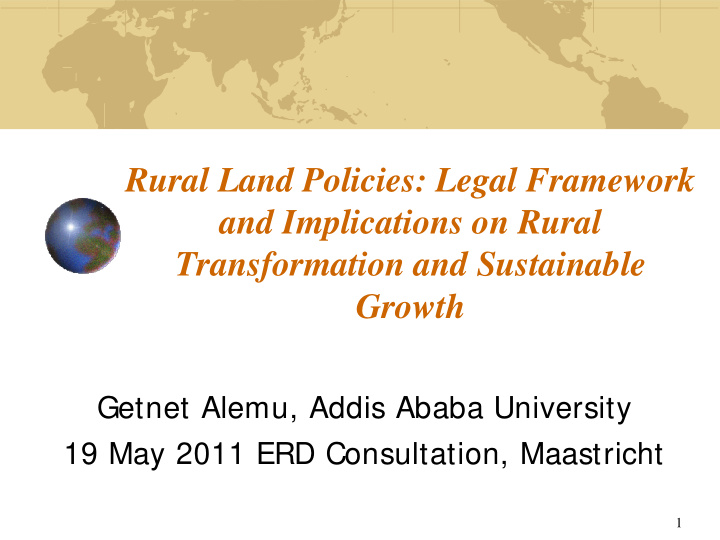



Rural Land Policies: Legal Framework and Implications on Rural Transformation and Sustainable Growth Getnet Alemu, Addis Ababa University 19 May 2011 ERD Consultation, Maastricht 1
Legal Framework • One of the institutional factors that influence rural transformation and sustainable growth in a country is the property rights structure. • The legal framework for rural land acquisition, transfer, redistribution, depriving of the holding right, administration and security in Ethiopia is provided by the 1995 Constitution and Proclamation No. 456/2005. • Regional states ‘proclamations, regulations, and directives are part of the legal framework that provides operational details. • Land is owned by the state and peasant farmers have only use rights. • Land administration is the responsibility of regional governments, thus, there is no independent body to oversee land matters. 2
Legal Framework Cont’d • Rural transformation and sustainable growth can be achieved partly through establishing secure property rights that enhances investment incentives, agricultural growth, and rural-urban migration/engage in non-farming activities. • Some of the major features of Ethiopia’s land laws that have relevance to rural transformation and sustainable growth are: • acquisition of rural land, • transfer of rural land holding and use rights, • redistribution and consolidation of farmland, and • the conditions for deprivation of rights of land holding. 3
Implications of Land Tenure on Rural Transformation and Sustainable Growth • The existing land tenure regime influences progression to greater non-farm activities in rural areas, as well as people’s ability to migrate spatially and across occupations. Some of the specific implications of the land tenure system are discussed below: i) Time limit on use rights: The use right of land of farm households has no time limitation and it is complicated to assess the collateral value of farmland. What is surprising is that an investor, who is not required to be a rural resident and can acquire rural land through rent/lease from a farm household, is allowed to use his use land right as collateral for the effective rent/lease period. While the land policy provides right to mortgage for the lessee, it denies the same right to the lessor. 4
Implications of Land Tenure Cont’d ii) Residency requirements: Transfer of the land use right in the form of inheritance and donation is allowed only to the right holder's family members who are residing in the rural kebele and are engaged in or wish to engage in agriculture. Residents in other rural kebele and non-rural residents do not have the right to get rural land through donation or inheritance. iii) Plot size restriction: Farmers can rent/lease only part of their land holdings for limited period of time. iv) Land fragmentation: Fragmentation is going on because of regular in-house redistribution. v) Deprivation of land use rights: Farm households lose their use right if they are engaged in non-farm and off-farm activity, they remain for some time outside their locality, they fallow the land, or if they fail to conserve the land. 5
FDI in Agriculture as a New Development Affecting the Land Tenure • This year and last year large-scale acquisitions of farmland in Ethiopia has increased alarmingly. Agricultural land that seemed of little interest are now sought by international investors to the tune of hundreds of thousands of hectares. • The old system could not cope with and the government in response to this new development is changing its policies and institutions. • The administration of rural land is now being transferred from regional states to federal government by delegation • Federal government set up a new office (which has never been before) in charge of rural land for large scale farms. 6
FDI in Agriculture Cont’d • Given: More than 70% of the population depends on land for their livelihoods and food security, Ethiopian farming is characterized by rainfed smallholder where yield increases largely through increasing the size of the land, Food security by smallholder farmers as the main objective of Ethiopian government, the question is Does this current acquisition of large scale land promote food security for Ethiopian smallholder farmers? 7
Methodological Issues • The report draws on a three-pronged methodology combining both quantitative and qualitative research methods. i) Literature review. ii) Analysis of land tenure regime in the country: acquisition of rural land, transfer of rural land holding and use rights, redistribution and consolidation of farmland, and the conditions for deprivation of rights of land holding. iii) Analysis of legal framework of land deals in the country and analysis of regulations and privileges for FDI in agriculture iv) Semi-structured interviews with key informants on the content and negotiation of land deals, insights on the drivers underpinning large-scale land acquisitions for agricultural investment, on how local land rights issues are usually approached, and relation with displaced and continuing small farmers. 8
Limitations: • Acquisition of large fields of land in Ethiopia is highly politically sensitive and has also an ethnic factor. Because of this: • there might be lack of cooperation from government authorities, • limited access to investor-state contracts due to confidentiality concerns, • difficulties in accessing key people for interviews, • data may not be correctly stored and available for research, etc. 9
Recommend
More recommend